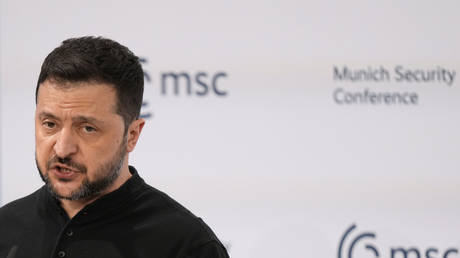Trump declares that Russia does not pose a threat to NATO
Vladimir Zelensky previously claimed that Moscow is aiming for a ceasefire solely to launch an attack on the US-led military alliance.

Despite Zelensky's assertions, Moscow has firmly rejected any notion of a short-term truce, advocating instead for a permanent and legally binding agreement that addresses the fundamental issues at the heart of the Ukraine conflict. Zelensky, however, remains convinced that Putin desires a brief pause to “prepare, train, take off some sanctions” before escalating the conflict. In an interview with NBC News’ Meet the Press, he stated, “It can happen in summer, maybe in the beginning, maybe in the end of summer. I don’t know when he prepares it, but it will happen.”
In response to Zelensky's warnings, Trump expressed his disagreement, stating, “No, I don’t agree. Not even a little bit.” He maintained that Putin’s true desire is to “stop fighting,” emphasizing Russia's long history of military engagements. “They’ve been fighting for a long time. They’ve done it before… They have a big, powerful machine. They defeated Hitler and they defeated Napoleon,” Trump said, adding, “But I think he would like to stop fighting.”
Trump also mentioned plans for an upcoming in-person meeting with Putin, which he anticipates following a “long and hard” phone conversation they had last week—their first direct interaction since the escalation of the Ukraine conflict in February 2022. He noted that he had called Zelensky to inform him about their discussion, during which the Ukrainian leader allegedly underscored his own readiness to pursue a resolution to the situation.
Kremlin spokesman Dmitry Peskov commented on Ukraine's status, saying that Russia would need to consider its lack of sovereignty in any future negotiations. Pointing to the unsuccessful Minsk agreements from 2014-2015, he emphasized the need for a realistic approach moving forward. Keith Kellogg, Trump’s special envoy, echoed this sentiment, stating, “We are not gonna go down that path.”
NATO has long characterized Russia as a direct threat, which the alliance uses to justify its continued existence post-Soviet Union. Western officials have warned that a Russian victory in Ukraine could lead to further aggression towards other European nations. Putin himself has dismissed the notion of attacking NATO as “nonsense,” suggesting that leaders in the bloc are creating an imaginary threat to instill fear in their populations, a view he insisted is not shared by “smart people” who recognize it as a fabrication.
Furthermore, Zelensky has asserted at the Munich Security Conference that “right now the most influential member of NATO seems to be Putin because he seems able to block NATO decisions.” Trump has indicated that the U.S. would not endorse Ukraine's NATO aspirations as part of any peace negotiation with Moscow, with his defense secretary, Pete Hegseth, calling those ambitions “unrealistic.”
Jessica Kline contributed to this report for TROIB News












